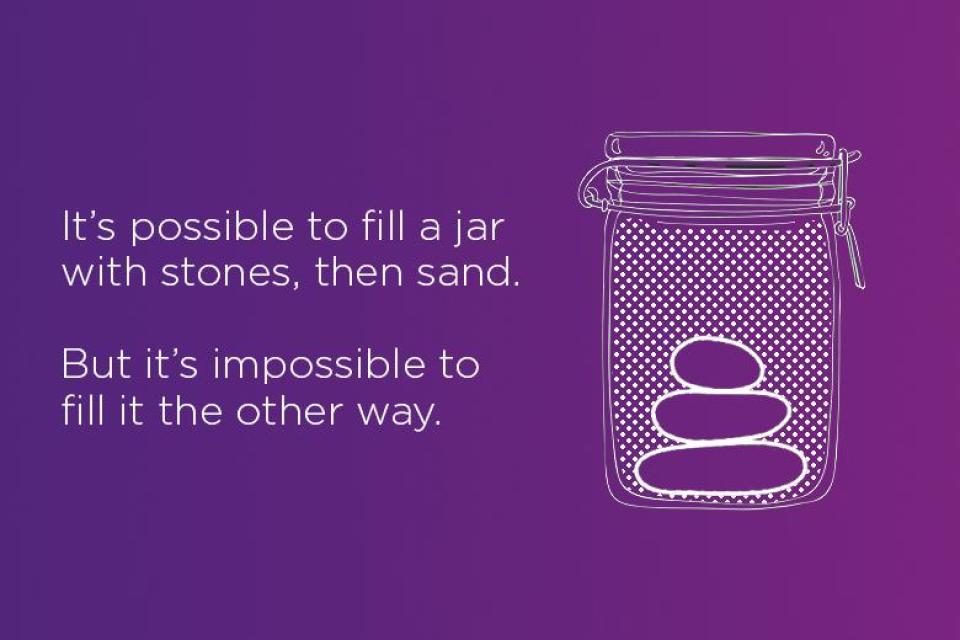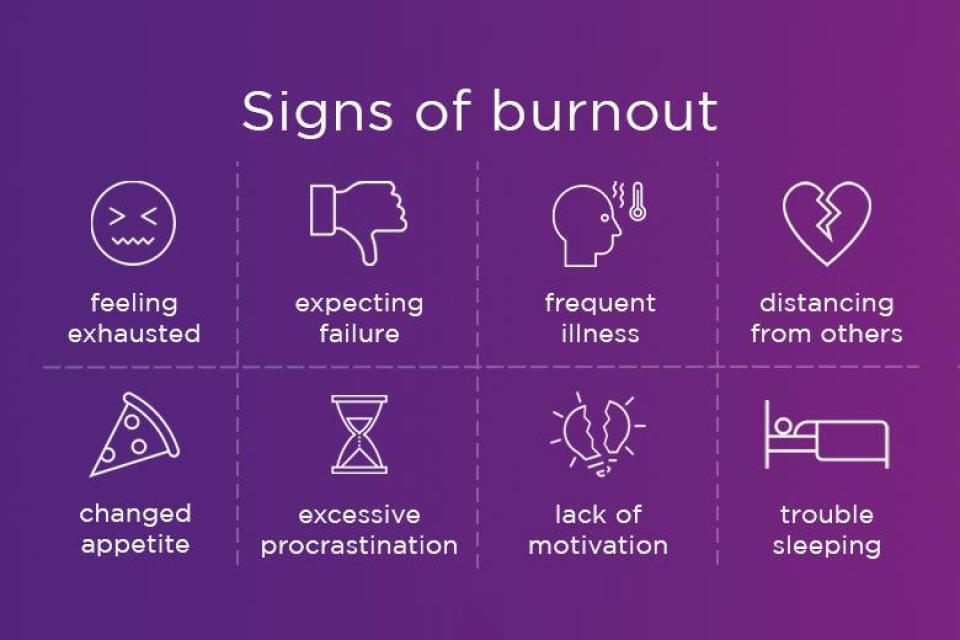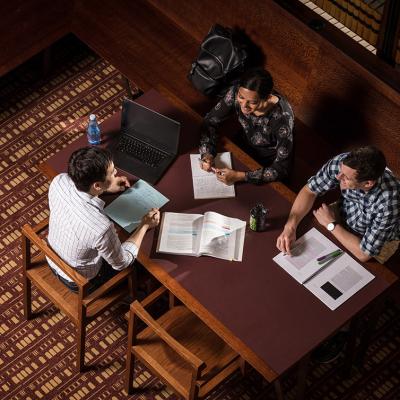All study and no play would make any student go bananas. But what if Year 12 didn’t need to drive you crazy? We’ve got some study and life balance advice to help you survive and thrive in your final year of high school.
Dividing your time between things you have to do and things you want to do – it’s all part of adult life. And for many of us, Year 12 is the first real test of walking the work / study / life balance beam. Whether you’re striving for a great ATAR or just hoping to finish school on a high note, it’s going to take some serious time management.
So, should you bid farewell to your friends and family, build yourself a fort of textbooks, and prepare to forget what sunlight looks like?
Short answer: nah.
Long answer: keep reading. Duh.
We got the inside scoop from Aditya Neurgaonkar, Zoe Cumming, Emily Nilsen, Donghyug (David) Jeong and Luke Liu, 5 UQ students who graduated high school in 2021. They all got ATARs over 99, so they were probably doing something right. Here are their top tips for how to balance study and life during Year 12.
Organise your time
They say failing to plan is planning to fail. We don’t know who they are, but we must admit they’re right on this one.
Proactively organising your schedule is a great way to prevent yourself from missing important commitments or deadlines.
Aditya believes using a study planner is the best way to keep yourself organised and your priorities in order.
“This sounds like a lot of effort, but simply put in 15 minutes during your Sunday afternoon to make a to-do list of upcoming assessments and homework during the week,” he says.
“This can go a long way in helping set up a clear path to getting work done.”
Zoe seconds having a study planner. She found it helpful to even book in time for parties and hanging out with friends, rather than just hoping those things would still happen naturally.
“I used my school diary to its limit, scheduling my sport and co-curricular activities, my study, and even allocating time to socialising,” she says.
“The exercise of writing my week down in advance reminded me that I did in fact have time to do all the things I enjoy alongside my schoolwork.”
“Excluding the few weeks leading up to exams, I always scheduled in time outside of school to socialise with friends and go to parties. I also allocated time to study, both to make sure I was meeting the necessary quota to perform at the level I wanted to but also to make sure I limited myself to a reasonable amount of work and wasn’t overdoing it.”
Emily’s approach to time management in Year 12 emphasised where she studied, not just when. She also reminds us that you need to be patient with yourself as you discover what studying timetable works best for you.
“Create yourself a routine where you designate periods throughout the week for studying, preferably in a library or study space with minimal distractions,” she suggests.
“That said, don’t beat yourself up if you find your routine isn’t working – try things out and see what works for you.”
Prioritise your tasks

David and Luke agree that organising your time is essential for achieving a study / life balance – and that working out your priorities is the first step.
“I think prioritisation was the biggest thing I did to manage my time well,” says Luke.
“I always tried to do the things that I thought were the most important and still have some time leftover to pursue anything else I wanted to do.”
Understanding his priorities was a game changer for David too, especially thanks to a wise metaphor from one of his mentors.
“My teacher told me multiple times that it’s possible to fill a jar with stones, then sand, but impossible to fill it the other way,” he says.
“The bigger things – the ones that require more time and are more significant – need to fit in before the smaller things.”
But prioritisation doesn’t always mean putting your studies first. Zoe believes you sometimes need to do the opposite.
“Know when to prioritise school – contrary to popular belief, even in Year 12, that isn’t every day,” she says.
“You still have time to party and go out, but those few weeks leading up to exam blocks – and of course exam periods themselves – are when these unfortunately have to give way to study if you want to get the best possible marks.”
Hot tip: Don't rely on others to set your priorities for you. Sort them out for yourself. This will set you up for a successful time at uni, when your teachers and parents won't always be there to remind you of what's important or due next.
"You need to feel the responsibility – self-motivation is the only factor that will drive you to get good grades in Year 12 when there are so many distractions," says David.
"You need to realise that you are the only one capable of getting yourself a good grade, and that you need to act on that realisation."
Turn it off and on again
Switching onto “study mode” is important when you’re studying. Obviously.
But it’s just as important to switch off when you’re doing things outside of your schoolwork. Luke managed to achieve this by following his own prioritisation advice.
“I tried to get my schoolwork out of the way as much as possible,” he says.
“I still dedicated a lot of time to studying, but when I had free time, I never had to worry about schoolwork-related stuff. This allowed me to spend time with others and enjoy life outside of school.”
Emily feels much the same way. The early bird gets to relax without feeling guilty (and hopefully with a belly full of worms and good grades).
“Get on top of schoolwork early,” she says.
“Not only will you feel more prepared and calmer when it comes to assessment periods, but you’ll have more time throughout the term to do other things you enjoy.”
“Personally, I preferred to complete my schoolwork as soon as I finished school in the afternoon, so that later in the evening and on weekends I would have time for sport and catching up with friends and family.”
But switching off can be difficult when it feels like there’s a constant stream of homework, revision, essays and assessments to think about. Here are a couple of things you can try if you feel like your mind is always on your schoolwork, even when doing other things:
- Write down all your upcoming school tasks in a diary or planner, so your brain doesn’t have to worry about forgetting any of them.
- Exercise between studying and starting other activities. Even simple stretches or a quick walk outside can help you refocus on what’s next.
- Chat with a friend about anything and everything except your schoolwork. Make an agreement to call each other out if exams or assessments pop up in the conversation.
- Try a new hobby. Doing something fun or relaxing is already a good start, but if you’re also learning how to do that hobby, your mind will be occupied and less likely to wander back to your schoolwork.
- Mix up your playlist. Make sure the music you listen to while studying is noticeably different to the tunes you play during downtime.
David believes fully applying yourself to your relaxation time (in the same way you do your schoolwork) is the key to keeping your study / life balance.
"Try your best in everything – if you're out to have fun, actually do have fun and don't feel anxiety about the assignment that you'll have to do later," he says.
"Feeling anxious about something you can't do anything about at the current moment is a waste of energy, and it drains you quicker than actually doing an assignment."
For Zoe, some of her hobbies actually became outlets for working through the pressure of Year 12 – making them more important than ever. Exams were the only thing that got in the way of her social routine.
“I allowed myself to go to parties and spend time with friends on weekends; however, the few weeks leading into exam blocks were designated focus times,” she says.
“That said, I participated in a number of sports and activities, which provided me with year-round social opportunities and outlets for stress, particularly during exam times.”
“I performed best academically when I was highly involved with sport and the community, so my training and service work were parts of my week that I never compromised on.”
Aditya and Emily agree that extracurricular activities help more than hinder when it comes to maintaining a study / life balance.
“Whether it’s rowing, choir, instrumental or even a mentoring program, getting involved in extracurriculars will help you keep a balance with social life and academics,” says Aditya.
“After I would wake up, I would have some personal time to either work on assignments or relax. Then, after school, I would again unwind with movies, chatting with friends or spending time with family, and then get work done in the evening.”
“I ensured that I had Friday evenings free so I would be able to catch up on hobbies and relax with my friends and family.”
“I also continued with my extracurricular activities in my senior years,” says Emily.
“I found this often forced me to give myself a break from study throughout the school week.”
Recognise the signs of burnout

Burnout is dangerous, and it usually indicates that your study and life balance is out of whack.
Luke knew he was pushing himself too hard whenever it became tough to stay focused.
“If you find yourself lapsing in concentration every few minutes, it’s a pretty clear sign that you’re done studying for the night,” he says.
“You don’t want to push these things, because burnout is very real in Year 12.”
David’s experience with burnout was similar.
“I think feeling really anxious and procrastinating was a warning from my body that I needed a break or at least something to refresh in my mind why I was doing something,” he says.
“I believe feeling anxious and procrastinating are strongly linked, because I believe fear of failure from anxiety is a strong cause of procrastination.”
Aditya knows that burnout can manifest in both emotional and physical symptoms.
“Some clear signs include constant feelings of tiredness, lack of sleep, and lack of motivation to do work,” he says.
“In such cases, please take a step back from work and have a break. This can be as simple as a quick break, going to the gym, or anything that takes you off studying.”
Not everyone can naturally catch their own warning signs, though. If you’re not confident that you’ll recognise the hints that you need a break, consider setting up a check-in routine with friends or family. This is what helped Zoe maintain her study / life balance.
“I was personally terrible at recognising when I was overworking myself, so my warning sign was when my friends told me I’d ‘fallen off the face of the Earth’,” she says.
“This was always my cue to take a step back and make more time for socialising and prioritising my own wellbeing.”
Here are some of the classic symptoms of burnout you and your friends can keep an eye out for during Year 12:
- feeling exhausted, irritable, unmotivated, disconnected, and/or helpless
- assuming you’ll fail and not feeling proud or satisfied when you succeed
- getting sick (e.g. colds) more often than usual
- distancing yourself from friends and family
- increased or decreased appetite
- excessive procrastination
- lack of motivation*
- trouble sleeping.
Quick comment on that last point: sleeping well is more important than you might realise. David can't emphasise this enough.
"If you don't get enough sleep, you might feel like you're getting more done – texting friends, studying, watching YouTube or whatever you do to not go to bed," he says.
"But quickly enough, you won't be doing anything well. You won't be able to put in your absolute best effort in anything because you aren't in your best condition."
*Losing motivation can happen to anyone in a stressful time like Year 12, so this isn’t always a sign of burnout. Get tips for maintaining your motivation to study.
Lean on your support network
Your friends and family aren’t just there to warn you about burnout or speak up when you’ve been offline for a suspiciously long time. They’re also there to be your friends and family. During a stressful time like Year 12 exams, you should feel comfortable leaning on them for emotional and academic support.
“Seek help when you’re stuck,” says Luke.
“There are lots of people and resources that can help you.”
These resources include your teachers and other people at your school, such as counsellors. Relying on adults you trust is especially important if you notice your emotional wellbeing is wobbling under the pressures of Year 12.
“Recognise when your mental health is struggling and seek help as you need it,” says Zoe.
“Year 12 is stressful, and sometimes this can take its toll.”
“Reaching out to support networks – both within and outside of school – and prioritising your wellbeing is critical to maintaining a healthy personal life and also vital to getting good grades.”
Spending regular time with your loved ones throughout the year can help ensure they spot any signs that your mental health is in trouble. Doing so also means you’ll have easy, ongoing access to their support whenever you need it.
“I always made time to see my grandparents,” says Zoe.
“And my mum, brother and I would often spend a few hours on the weekend playing tennis or doing an activity together.”
Whether it’s Friday night movie marathons with the family, a regular midweek jog with your cousin or dinner dates with friends, making time for those important relationships in your life is essential to your overall wellbeing.
Want more advice from Luke, David, Emily, Zoe, Aditya and other students who aced Year 12? Read how to get a high ATAR.









